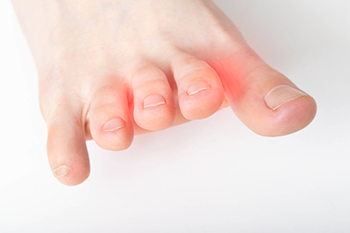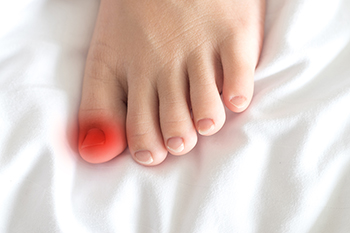Items filtered by date: November 2024
Exercises for Strong and Pain-Free Feet

Simple foot stretches and exercises promote strength, flexibility, and long-term mobility, helping prevent pain and stiffness. Strengthening and stretching the feet can enhance stability, balance, and endurance, making daily activities easier and reducing the risk of injury. One effective exercise is toe curls which involves placing a small towel on the floor, and using your toes to scrunch it toward you, then pushing it away. This strengthens arch and toe muscles, supporting foot mechanics. Another beneficial stretch is the calf stretch. Stand facing a wall, place one foot forward and the other back, keeping the back heel down and leaning forward slightly. This stretch targets the Achilles tendon and calf muscles, reducing tension in the feet. Incorporating such exercises regularly can keep your feet healthy. If you would like to learn more about how you can take care of your feet, it is suggested that you schedule an appointment with a podiatrist who can diagnose any foot or ankle problem, provide treatment, and guide you to additional foot care.
Why Stretching Is Important for Your Feet
Stretching the feet is a great way to prevent injuries. If you have any concerns with your feet consult with Deborah Rosenfeld from Rosenfeld Podiatry. Our doctor will assess your condition and provide you with quality foot and ankle treatment.
Stretching the Feet
Stretching the muscles in the foot is an important part in any physical activity. Feet that are tight can lead to less flexibility and make you more prone to injury. One of the most common forms of foot pain, plantar fasciitis, can be stretched out to help ease the pain. Stretching can not only ease pain from plantar fasciitis but also prevent it as well. However, it is important to see a podiatrist first to determine if stretching is right for you. Podiatrists can also recommend other ways to stretch your feet. Once you know whether stretching is right for you, here are some excellent stretches you can do.
- Using a foam roller or any cylindrical object (a water bottle or soda can will do), roll the object under your foot back and forth. You should also exert pressure on the object. Be sure to do this to both feet for a minute. Do this exercise three times each.
- Similar to the previous exercise, take a ball, such as a tennis ball, and roll it under your foot while seated and exert pressure on it.
- Grab a resistance band or towel and take a seat. If you are using a towel, fold it length wise. Next put either one between the ball of your foot and heel and pull with both hands on each side towards you. Hold this for 15 seconds and then switch feet. Do this three times for each foot.
- Finally hold your big toe while crossing one leg over the other. Pull the toe towards you and hold for 15 seconds. Once again do this three times per foot.
It is best to go easy when first stretching your foot and work your way up. If your foot starts hurting, stop exercising to ice and rest the foot. It is advised that you then see a podiatrist for help.
If you have any questions, please feel free to contact our office located in Marlton, NJ . We offer the newest diagnostic and treatment technologies for all your foot care needs.
Understanding Diabetic Foot Ulcers

Diabetic foot ulcers are serious wounds that develop on the feet of individuals with diabetes, primarily due to nerve damage and poor circulation. Common causes include prolonged pressure, injury, or infection, which can occur when blood sugar levels are poorly managed. Symptoms typically include red or swollen areas, open sores, and sometimes drainage or a foul odor. If left untreated, these ulcers can lead to severe infections and even amputation. Treatment involves wound care, proper footwear, and controlling blood sugar levels. A podiatrist plays a key role in managing diabetic foot ulcers, offering specialized assessments, debridement of the wound, and creating a tailored care plan. They can also provide advice on footwear to prevent further injury. If you or a loved one is experiencing symptoms of a diabetic foot ulcer, it is suggested you make an appointment with a podiatrist. Early intervention can help prevent complications and promote healing.
Diabetic foot care is important in preventing foot ailments such as ulcers. If you are suffering from diabetes or have any other concerns about your feet, contact Deborah Rosenfeld from Rosenfeld Podiatry. Our doctor can provide the care you need to keep you pain-free and on your feet.
Diabetic Foot Care
Diabetes affects millions of people every year. The condition can damage blood vessels in many parts of the body, especially the feet. Because of this, taking care of your feet is essential if you have diabetes, and having a podiatrist help monitor your foot health is highly recommended.
The Importance of Caring for Your Feet
- Routinely inspect your feet for bruises or sores.
- Wear socks that fit your feet comfortably.
- Wear comfortable shoes that provide adequate support.
Patients with diabetes should have their doctor monitor their blood levels, as blood sugar levels play such a huge role in diabetic care. Monitoring these levels on a regular basis is highly advised.
It is always best to inform your healthcare professional of any concerns you may have regarding your feet, especially for diabetic patients. Early treatment and routine foot examinations are keys to maintaining proper health, especially because severe complications can arise if proper treatment is not applied.
If you have any questions please feel free to contact our office located in Marlton, NJ . We offer the newest diagnostic and treatment technologies for all your foot and ankle needs.
The Odd Sensation of a Morton’s Neuroma

Morton’s neuroma, or interdigital neuroma, is a painful condition caused by the thickening of tissue surrounding one of the nerves in the midfoot, often between the third and fourth toes. This irritation results from nerve compression, frequently due to repetitive stress or pressure from wearing tight or high-heeled shoes. The condition can feel like a sharp, burning pain in the ball of the foot, often radiating to the toes. Some patients describe it as feeling as though they are standing on a pebble, or having a clicking sensation. Risk factors include high-impact activities like running, foot deformities such as bunions or flat feet, and poor footwear choices. Diagnosis often involves a physical exam, an ultrasound, or an MRI scan. Treatment ranges from modifying footwear and orthotics to corticosteroid injections or, in severe cases, surgical removal of the affected nerve tissue. If you have this odd and painful sensation in your foot, it is suggested that you schedule an appointment with a podiatrist for a proper diagnosis and treatment.
Morton’s neuroma is a very uncomfortable condition to live with. If you think you have Morton’s neuroma, contact Deborah Rosenfeld of Rosenfeld Podiatry. Our doctor will attend to all of your foot care needs and answer any of your related questions.
Morton’s Neuroma
Morton's neuroma is a painful foot condition that commonly affects the areas between the second and third or third and fourth toe, although other areas of the foot are also susceptible. Morton’s neuroma is caused by an inflamed nerve in the foot that is being squeezed and aggravated by surrounding bones.
What Increases the Chances of Having Morton’s Neuroma?
- Ill-fitting high heels or shoes that add pressure to the toe or foot
- Jogging, running or any sport that involves constant impact to the foot
- Flat feet, bunions, and any other foot deformities
Morton’s neuroma is a very treatable condition. Orthotics and shoe inserts can often be used to alleviate the pain on the forefront of the feet. In more severe cases, corticosteroids can also be prescribed. In order to figure out the best treatment for your neuroma, it’s recommended to seek the care of a podiatrist who can diagnose your condition and provide different treatment options.
If you have any questions, please feel free to contact our office located in Marlton, NJ . We offer the newest diagnostic and treatment technologies for all your foot care needs.
Painful Ingrown Toenails

An ingrown toenail occurs when the edge of the toenail grows into the surrounding skin, leading to pain, redness, and swelling. This condition commonly affects the big toe and can be caused by improper nail trimming, wearing tight shoes, or injury to the toe. Symptoms typically include localized pain, tenderness, and, in some cases, drainage of pus, indicating an infection. If left untreated, ingrown toenails can lead to more serious complications. Initial relief options include soaking the affected foot in warm water, gently lifting the nail edge, and wearing properly fitting shoes to relieve pressure. However, if the ingrown toenail persists, becomes infected, or causes severe pain, it is important to see a podiatrist. This type of doctor may recommend antibiotics or a minor surgical procedure to remove the ingrown portion of the nail. If you are experiencing discomfort from an ingrown toenail, it is suggested you schedule an appointment with a podiatrist for an accurate diagnosis and effective treatment options.
Ingrown toenails may initially present themselves as a minor discomfort, but they may progress into an infection in the skin without proper treatment. For more information about ingrown toenails, contact Deborah Rosenfeld of Rosenfeld Podiatry. Our doctor can provide the care you need to keep you pain-free and on your feet.
Ingrown Toenails
Ingrown toenails are caused when the corner or side of a toenail grows into the soft flesh surrounding it. They often result in redness, swelling, pain, and in some cases, infection. This condition typically affects the big toe and may recur if it is not treated properly.
Causes
- Improper toenail trimming
- Genetics
- Improper shoe fitting
- Injury from pedicures or nail picking
- Abnormal gait
- Poor hygiene
You are more likely to develop an ingrown toenail if you are obese, have diabetes, arthritis, or have any fungal infection in your nails. Additionally, people who have foot or toe deformities are at a higher risk of developing an ingrown toenail.
Symptoms
Some symptoms of ingrown toenails are redness, swelling, and pain. In rare cases, there may be a yellowish drainage coming from the nail.
Treatment
Ignoring an ingrown toenail can have serious complications. Infections of the nail border can progress to a deeper soft-tissue infection, which can then turn into a bone infection. You should always speak with your podiatrist if you suspect you have an ingrown toenail, especially if you have diabetes or poor circulation.
If you have any questions, please feel free to contact our office located in Marlton, NJ . We offer the newest diagnostic and treatment technologies for all your foot care needs.


